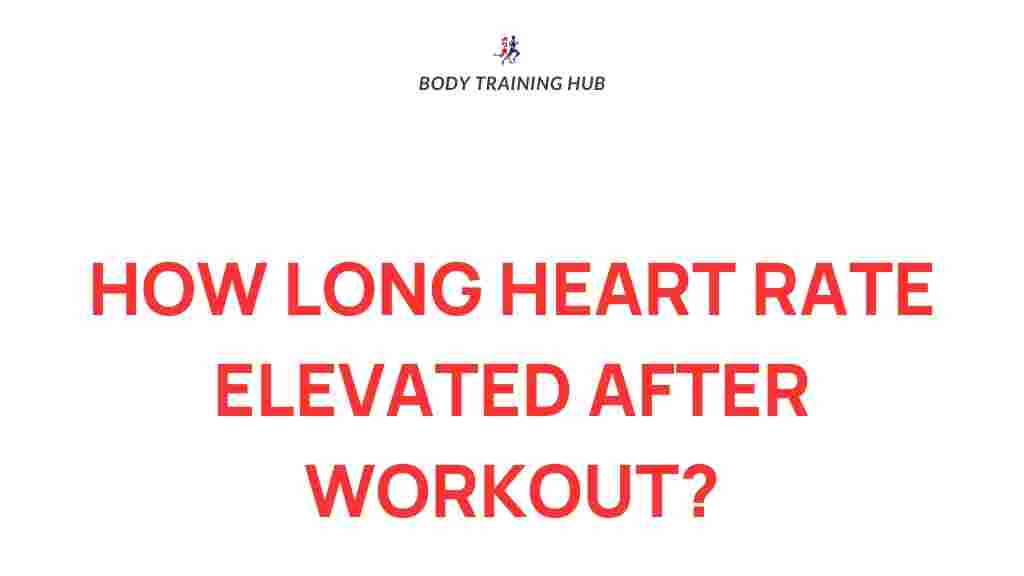Unveiling the Surprising Truth About Post-Workout Heart Rate Duration
When you finish an intense exercise session, your heart rate is undoubtedly elevated, but how long does it stay that way? Understanding the duration of your elevated heart rate post-workout can offer valuable insights into your recovery, cardiovascular health, and overall fitness. In this article, we will delve into the science behind heart rate recovery, factors influencing it, and what it means for your endurance and health.
The Importance of Heart Rate in Fitness
Heart rate is a crucial indicator of cardiovascular health and fitness levels. Monitoring your heart rate during and after exercise helps you assess your endurance and recovery capabilities. Here are some key reasons why heart rate is significant in fitness:
- Performance Indicator: A lower resting heart rate is generally a sign of better cardiovascular fitness.
- Recovery Assessment: The speed at which your heart rate returns to normal after exercising indicates how well your body is recovering.
- Intensity Monitoring: Tracking heart rate during workouts helps ensure you are exercising within your desired intensity zones.
Understanding Elevated Heart Rate Post-Workout
After completing a workout, your heart rate remains elevated due to several physiological processes. This phenomenon is known as excess post-exercise oxygen consumption (EPOC), which is the body’s way of returning to its pre-exercise state. Here’s how it works:
- Your body continues to burn calories even after exercising, which requires oxygen.
- Muscles need to recover and repair, which also contributes to higher oxygen consumption.
- Hormonal changes occur that affect metabolic processes, further keeping your heart rate elevated.
Factors Influencing Post-Workout Heart Rate Duration
The duration of an elevated heart rate after exercise can vary significantly among individuals and is influenced by several factors, including:
- Fitness Level: More conditioned athletes typically experience faster heart rate recovery.
- Type of Exercise: High-intensity interval training (HIIT) often leads to longer elevated heart rates compared to moderate-intensity steady-state exercise.
- Age: Younger individuals tend to recover quicker than older adults.
- Hydration and Nutrition: Proper hydration and nutrient intake can aid recovery and influence heart rate duration.
- Stress Levels: Elevated stress can prolong recovery time and heart rate elevation.
How to Measure Your Post-Workout Heart Rate
To effectively monitor your heart rate post-exercise, follow these steps:
- Use a Heart Rate Monitor: Wear a heart rate monitor or fitness tracker to get accurate readings during and after your workout.
- Know Your Resting Heart Rate: Measure your resting heart rate first thing in the morning for consistency.
- Perform a Workout: Engage in a workout that elevates your heart rate significantly.
- Monitor Recovery: After completing your workout, check your heart rate at regular intervals (1, 3, 5, and 10 minutes post-exercise).
What is a Normal Recovery Rate?
A general guideline for heart rate recovery is:
- Your heart rate should drop by at least 20 beats per minute within the first minute after stopping exercise.
- A recovery of 30 beats per minute or more is considered excellent.
However, it’s essential to remember that individual differences exist, and factors like fitness level, age, and health conditions play a significant role.
Common Troubleshooting Tips for Heart Rate Recovery
If you notice that your heart rate is not recovering as quickly as you expect, consider the following troubleshooting tips:
- Evaluate Your Workout Intensity: Ensure you are not overtraining, as excessive intensity can hinder recovery.
- Focus on Hydration: Dehydration can affect heart rate recovery; drink plenty of fluids before, during, and after your workout.
- Monitor Your Nutrition: Consuming a balanced diet rich in vitamins and minerals aids recovery.
- Incorporate Cool Down Sessions: Gradually lowering your heart rate with a cool-down routine can help improve recovery times.
- Consider Stress Management: Implementing relaxation techniques can help lower stress and improve recovery.
Benefits of Improving Your Heart Rate Recovery
Improving your heart rate recovery has several benefits, including:
- Enhanced Endurance: Faster recovery leads to better performance in subsequent workouts.
- Lower Risk of Cardiovascular Diseases: A more efficient heart rate recovery indicates better heart health.
- Increased Fitness Levels: Regularly monitoring and improving recovery can lead to overall improved fitness.
Conclusion
Understanding the duration of your elevated heart rate post-workout is crucial for assessing your cardiovascular health, fitness level, and recovery capabilities. By monitoring your heart rate and implementing strategies to improve recovery, you can enhance your endurance and overall health. Remember, the journey to better fitness is not just about how hard you work out but also about how well you recover.
For more insights on heart health and fitness, consider visiting American Heart Association for reliable resources.
Ready to take your fitness to the next level? Explore our comprehensive guides on exercise techniques and recovery strategies to optimize your workouts and health.
This article is in the category Cardio & Endurance and created by BodyTraining Team
